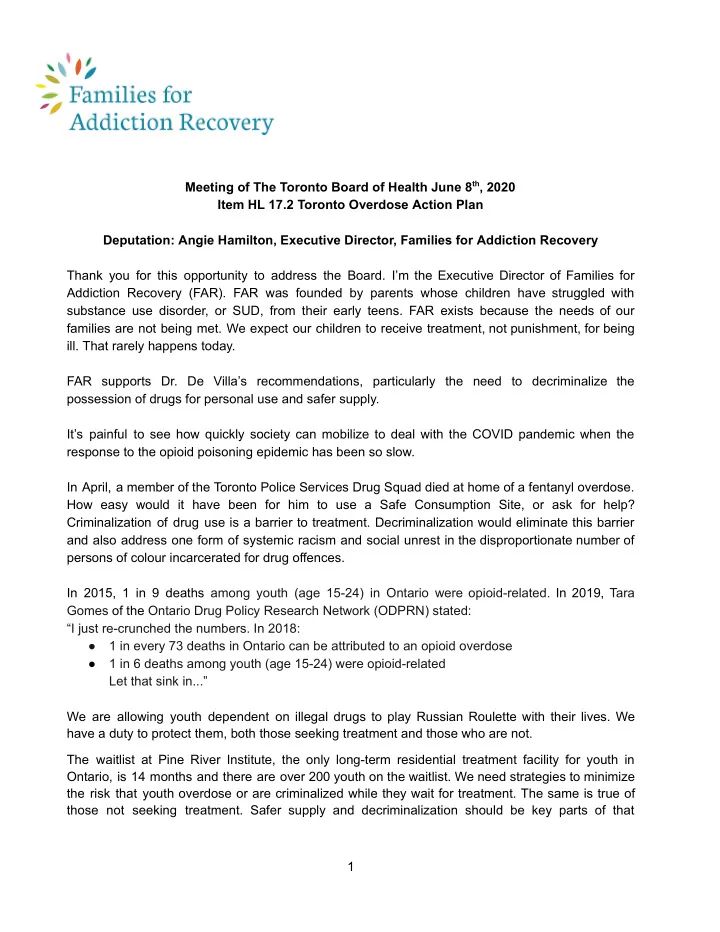

Meeting of The Toronto Board of Health June 8 th , 2020 Item HL 17.2 Toronto Overdose Action Plan Deputation: Angie Hamilton, Executive Director, Families for Addiction Recovery Thank you for this opportunity to address the Board. I’m the Executive Director of Families for Addiction Recovery (FAR). FAR was founded by parents whose children have struggled with substance use disorder, or SUD, from their early teens. FAR exists because the needs of our families are not being met. We expect our children to receive treatment, not punishment, for being ill. That rarely happens today. FAR supports Dr. De Villa’s recommendations, particularly the need to decriminalize the possession of drugs for personal use and safer supply. It’s painful to see how quickly society can mobilize to deal with the COVID pandemic when the response to the opioid poisoning epidemic has been so slow. In April, a member of the Toronto Police Services Drug Squad died at home of a fentanyl overdose. How easy would it have been for him to use a Safe Consumption Site, or ask for help? Criminalization of drug use is a barrier to treatment. Decriminalization would eliminate this barrier and also address one form of systemic racism and social unrest in the disproportionate number of persons of colour incarcerated for drug offences. In 2015, 1 in 9 deaths among youth (age 15-24) in Ontario were opioid-related. In 2019, Tara Gomes of the Ontario Drug Policy Research Network (ODPRN) stated: “I just re-crunched the numbers. In 2018: ● 1 in every 73 deaths in Ontario can be attributed to an opioid overdose ● 1 in 6 deaths among youth (age 15-24) were opioid-related Let that sink in...” We are allowing youth dependent on illegal drugs to play Russian Roulette with their lives. We have a duty to protect them, both those seeking treatment and those who are not. The waitlist at Pine River Institute, the only long-term residential treatment facility for youth in Ontario, is 14 months and there are over 200 youth on the waitlist. We need strategies to minimize the risk that youth overdose or are criminalized while they wait for treatment. The same is true of those not seeking treatment. Safer supply and decriminalization should be key parts of that 1
strategy, particularly during COVID-19 when social distancing is required and it is so difficult to respond to overdoses. Addiction, the severe end of SUD, is self-harm. It is compulsive drug use, in spite of adverse consequences. The primary purpose of criminal law is to protect people from other people, not to protect them from themselves. Protecting people from themselves is properly done through our health laws. As we have recognized with alcohol and cannabis, there is nothing inherently criminal in consuming a substance or in self-harm. Let me give you an analogy. Prior to 1972, it was illegal in Canada to attempt suicide (the ultimate expression of self-harm). We look at that law today and think it’s ridiculous. How could we ever help someone struggling with their mental health by incarcerating or otherwise punishing them? It’s time we realized it’s the same for people with SUD. I’m asking you to consider if the criminalization of drug use is responsible for the very different societal reactions to attempted suicide on the one hand, and addiction to an illegal substance on the other. Imagine your child is suicidal and on a bridge: ● It’s recognized as self-harm and an illness ● We intervene (side with family and child against the illness) ● We provide treatment (although there are huge waitlists here too) ● We don’t: talk about their poor choices that brought them to the bridge o say “they have to hit rock bottom” or “they have to want help” o talk about their right to jump o ● No societal talk of “thinning the herd” But if your child is addicted to an illegal substance (self-poisoning/Russian roulette): ● It’s not recognized as self-harm or an illness but as a criminal activity ● We don’t intervene, regardless of age (side with illness against family and child) ● We provide punishment and a criminal record instead of treatment ● We: talk about poor choices o say “they have to hit rock bottom” or “they have to want help” o talk about their right to refuse treatment (right to jump) o ● Societal talk of “thinning the herd” Criminalization prevents our family members from getting the help they need. With political will, decriminalization and a safer supply are the fastest and least expensive interventions to save lives. It is the least we can do. There also needs to be a continued health response to SUD beyond saving the life of the person with a safer supply in order to support a return to health and wellness. Some will be afraid to decriminalize drugs and provide a safer supply. Our families are much more afraid of the status quo. 2
3
Recommend
More recommend